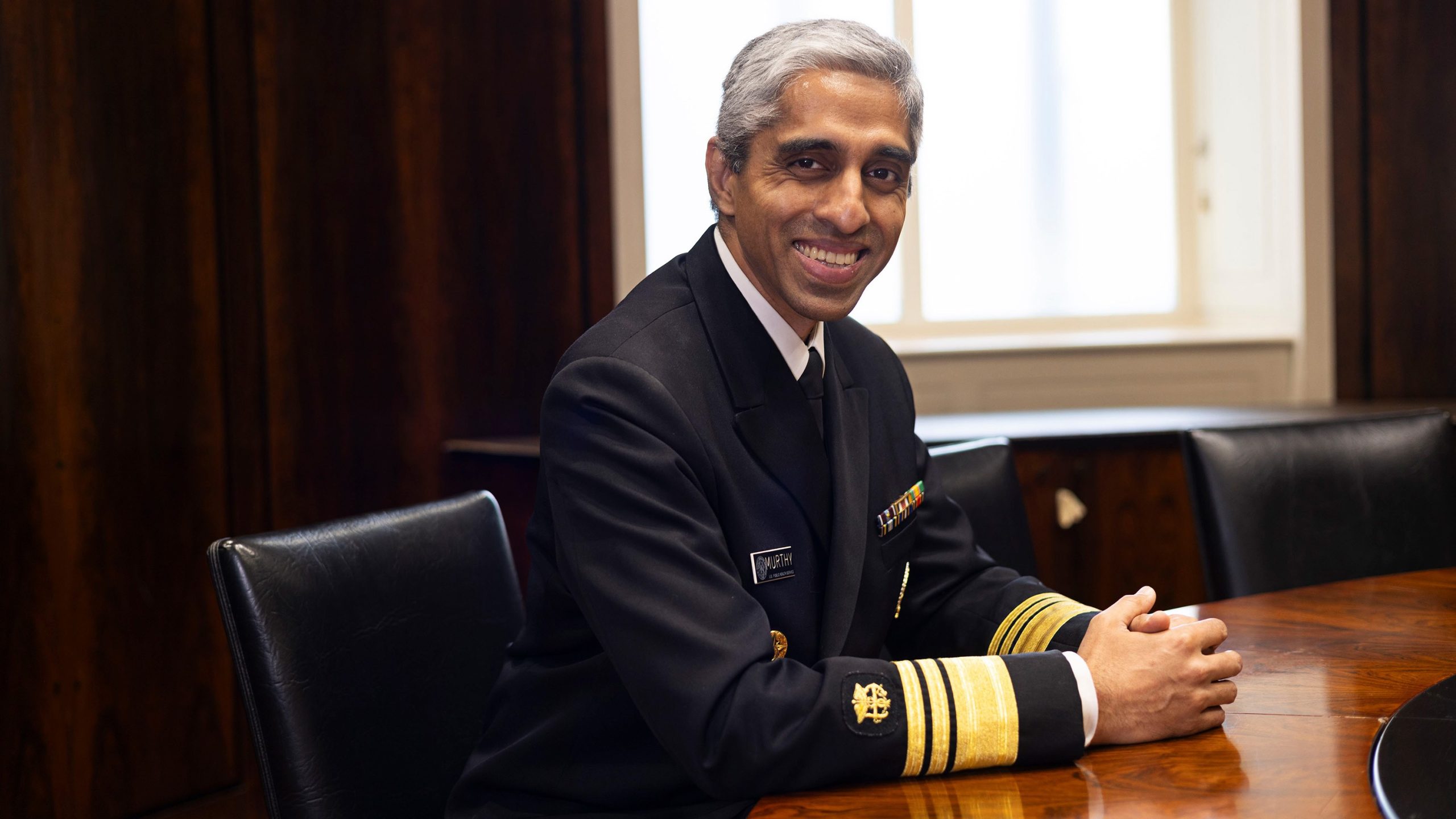Vivek Murthy, the surgeon general of the United States, used to spend his time focused on the traditional issues of the nation’s doctor. He led campaigns and authored reports to promote physical activity, limit adolescents’ vaping, and improve treatment for alcohol and drug addiction. He reminded us to eat our fruits and vegetables.
These days, he’s more likely to talk about friendship and Americans’ desperate need for more of it. Last year, he gave this phenomenon a grave, official designation: The country is experiencing an “epidemic of loneliness and isolation.” His office encourages people to document the ways they’ve connected with others on a postcard, an act that will supposedly help enhance the function of their immune system. He offers what he has referred to as “disarmingly simple” relationship-building techniques, such as company-mandated conversations with co-workers about personal matters. The surgeon general’s official website has even pushed a third-party digital solution called FriendApp that’s positioned itself as a gentler alternative to the most popular social-media platforms. These are among the more concrete recommendations in Murthy’s anti-loneliness campaign. The official government advisory also encourages people to “invest time in nurturing your relationships through consistent, frequent, and high-quality engagement” and to “be responsive, supportive, and practice gratitude.”
Speaking as someone who has struggled to make connections, I appreciate Murthy’s concern. Speaking as a practicing physician, I think he’s being a little goofy. Past surgeons general have mostly lectured the public on the dangers of cigarettes or cholesterol and saturated fat. Murthy’s predecessor, Jerome Adams, prioritized the opioid epidemic, oral health, and COVID. Murthy, on the other hand, has preached about the importance of finding emotional fulfillment, using love as medicine, and treating art as a source of healing. The surgeon general appears to have transformed himself from the nation’s doctor into something newer: its first chief wellness officer.
When I spoke with Murthy a few weeks ago, I told him that his advocacy reminded me more of self-help bromides than public-health advice. I asked him why so many of his recent projects—the immunity-boosting postcard, for example—seemed superficial and gimmicky. “Well, I would characterize the work we do as different than ‘superficial and gimmicky,’” he responded in the same amiable voice he uses to narrate mindfulness exercises for the meditation app Calm. He assured me that “small steps can make a difference when it comes to building social connection” and that his work is backed up by data. “The science drives what we do in our office,” he said. By the time our call was over, I felt like an anti-wellness ogre.
Murthy dipped his toes into the placid waters of holistic health while serving his first stint in office, during the Obama administration. (In 2015, he prescribed happiness to a TED Talk audience.) After leaving, he published a best-selling book about the “healing power of human connection.” Since being back in uniform—President Joe Biden reappointed him surgeon general in 2021—Murthy has been hammering wellness tropes with singular determination. He’s put out reports and press releases promoting “work-life harmony,” endorsing a “culture of gratitude and recognition,” and treating “quiet quitting” as if it were an outbreak of disease. His biweekly podcast promises to help listeners “navigate the messiness and uncertainties of life to find meaning and joy.” Last fall, he told the health-and-fitness guru Andrew Huberman that “there are people who may not have diagnosable mental illness but are not operating optimally in their lives, and that’s detracting from their fulfillment.”
In Murthy’s diagnosis of our national mood, loneliness isn’t merely a bad feeling; it’s poison for our body. Although loneliness certainly isn’t good for us, the surgeon general has made some oddly specific claims. Is feeling isolated really equivalent to smoking up to 15 cigarettes a day, as his social-connection advisory declares? A published study says so, but medical experts have made similar statements about sitting, alcohol, air pollution, and processed foods. Those have each been characterized as the “new smoking”—yet it is tobacco, the most conventional of public-health concerns, that remains the leading cause of preventable death. Besides, if being lonely were only as bad as, say, smoking five cigarettes a day, would we find it any less distressing? I think most people know that such assertions aren’t meant to be taken literally: They’re metaphors, not statistics. But when the surgeon general disseminates incredible statements—when he implies that loneliness is literally as harmful as sucking dozens of carcinogens into your lungs—some Americans may more easily dismiss his credible points, such as his important work on gun violence.
Talking with Murphy, I found it hard not to feel moved by his passion and drawn in by his congeniality. He started our conversation by asking me about my college experience, then talking about the difficult time he had getting to know people in school. I don’t believe that his priorities are entirely misguided. I have witnessed a yearning for connection in my own community. I’ve also seen its downstream consequences on people’s bodies. I have patients who have waited far too long to seek out treatment, because they had no one in their lives looking out for them. And his wellness-based initiatives do have some meaningful components: Murthy has endorsed paid family leave and improved public transit as policies that could bring relief to our disconnected nation.
But on the whole, the loneliness report offers only vague directives. Social connection should be made a priority for research institutions, governments, health systems, and workplaces. Public-health departments are urged to find “sustainable interventions and strategies” to promote it. The details of these interventions and strategies are mostly left to the reader’s imagination. One night at dinner, for instance, I suggested to my partner that perhaps Murthy’s guidance could help us make friends in our new home in Baltimore. We took up the surgeon general’s advice to join a community group, eventually landing on an LGBTQ dinner club. Over the next few months, we met nice people and had pleasant conversations. It was good to get out of the house. But I can’t say that we formed any deep, enduring friendships—the type I’d consider “high-quality engagement” that might extend my life.
For Murthy, focusing on general well-being allows him to tap into a long-standing and lucrative market. Speaking gigs, book deals, and consulting opportunities will surely await him after he leaves office—if he so desires. He’ll be particularly well positioned for the corporate world, where chief wellness officers are de rigueur. (These days, even the CIA has one!) He’s already done work for companies including Netflix, Airbnb, and Estée Lauder, and he’s served as an adviser for Attention, a “technology company focusing on mental health,” as it is described in his 2021 public financial disclosure. Murthy told me that he didn’t yet know what his future plans might be, but that “the question of how we enhance the overall health and well-being of people in our country and around the world will remain important” to his work.
But Murthy has now set up a quandary for every surgeon general who follows him. Should the nation’s doctor continue to dispense prescriptions for happiness and love? Or should the office go back to giving staid advice on how to curb the nation’s rates of chronic illness? Fostering the total physical and spiritual well-being of all citizens sounds pretty good, but it’s also quite ambitious. Murthy may be relying on gimmicks and gestures because he’s run up against the limits of his role. Helping someone quit cigarettes is a measurable goal with clear results; undoing 15 cigarettes’ worth of loneliness each day is a squishier project. And however well intentioned Murthy might be, a federal bureaucracy will never be a natural place to turn to for emotional healing. America’s doctor might have to settle for getting us to eat a few more fruits and vegetables.

